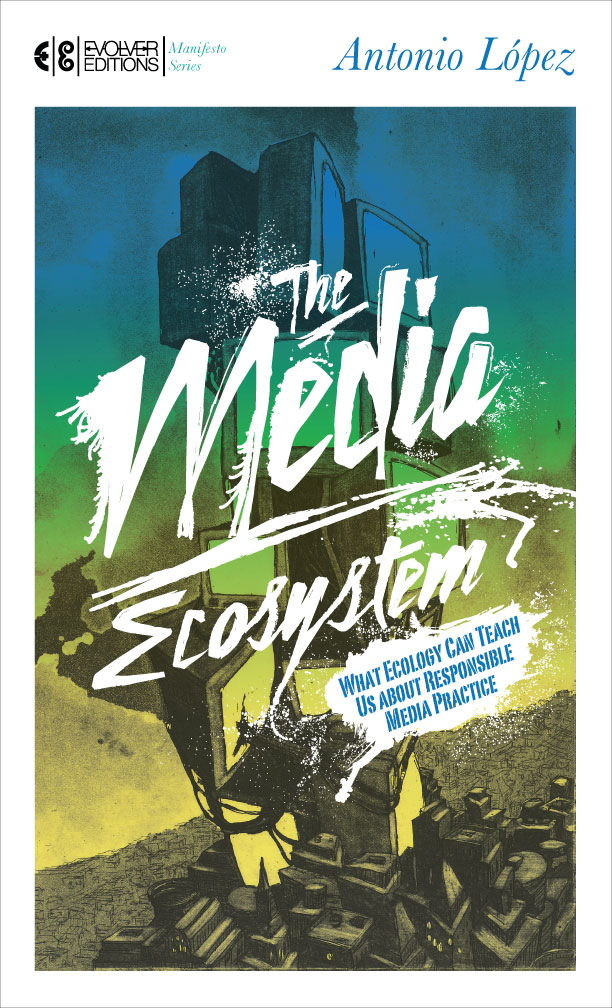In Media Ecosystem, Antonio Lopez examines how participatory media can draw an end to the ‘world system’ of the Industrial-Scientific Revolution and supplant it with a much needed Sustainability Revolution.
Media Ecosystem is an Evolver Editions ‘Manifesto Series’ and it reads as such, tackling head-on the colonial capitalist neoliberal worldview and system that is destroying our world. I read it as something of a change from his previous Mediacology book where he expressed the opinion that “critical pessimists” hinder the development of good working media literacy.
But perhaps it isn’t much of a change, as the pessimism is balanced by an approach that looks at what we can do to create better, more ‘organic’ media culture.
One central thesis is that media should be looked upon as a living system, an ecosystem, and that — while others have used similar metaphors before — what’s new is applying true ecological understanding to our analysis and actions. Thus, the references to media permaculture, (guerrilla) gardening, monoculture, farmer markets, among others, are much more than simply metaphors. For instance, applying the principles of permaculture to media making and organization is a useful exercise with practical applications.
It’s an ecological approach to media that both understands the world of media as an ecosystem, and connects media to the physical world and ecological problems that are caused both directly and indirectly through media. It looks not only at the ecological footprint of our media systems, but the mindprint that exposure to dominant corporatized mass media leaves on us.
Lopez sees the cultural commons as a vital source of our very survival, and aptly attacks the capitalist/colonial efforts of corporate media at enclosing more and more of this commons, making it a private and profitable resource to be exploited rather than one that will be of overall societal benefit.
One strength of the book is his application of the concept that we need fresh eyes to look at these problems, that we need to make things seem strange in order to see them anew and for what they are. For example, have you ever thought about how you were never ‘taught’ how to watch TV? Or how most mass media resembles ‘convenience’ stores, with very little healthy content and a uniform disconnection to its local environment?
Some of the examples explored may be ‘exceptional’ cases (the Arab spring, the Occupy movement, Avatar) and also point to the fleeting nature of looking at how media works, but there are definitely lessons to be learned that Lopez’ analysis pulls out of these cases. One striking element of our developing unfiltered, peer-to-peer networks he highlights is the way empathy, resonance and solidarity can be communicated to and from those in the midst of risky action and political repression, bolstered in their cause knowing that people elsewhere are aware and in moral support of them.
He sees the dual nature of media as being able to either serve democracy or corporate control, and sees the ‘remediation’ (remedy) of our situation as requiring an open system that allows for negative feedback to bring about balance, rather than a closed system where positive feedback creates a disastrous snowball effect. He explores the key role of participatory media in bringing about the creation of this new balance, of bringing in the needed sustainability revolution, but he also has a warning: “The rhetoric of an interconnected nervous system facilitated by computer networks sounds appealing, yet it is potentially dangerous if we don’t consider the implications of building a distorted and alienated brain.” And thus the need for us to really consider the kind of ecology we are creating with our media systems, and how they affect our self-concept and relation to the world.
The book may be less subtle or self-reflexive than his previous work — for example, this time around he doesn’t examine what it means to use a book to examine the topic of media — but it is still able to ground the reader in concepts that may be both unfamiliar and yet familiar at the same time. Rooting an analysis of media use in understandings of colonialism and in ecopsychology, while bringing in ideas from thinkers such as McLuhan to complement that, is a very useful exercise to help stimulate deeper thinking about how we do use media, and how it uses us.—Greg Macdougall
Greg Macdougall is a media activist, organizer and learning coach living in Ottawa, unceded Algonquin territory. His website is EquitableEducation.ca.



